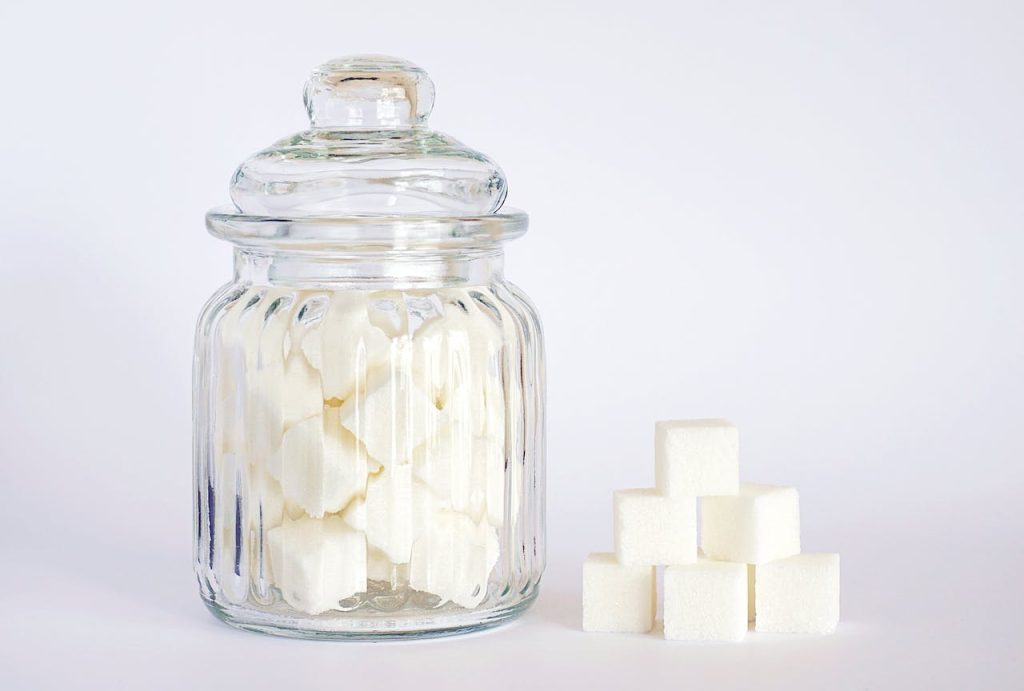Why is it bad to eat too much sugar: Sugar is fine for you in small amounts, but too much can result in weight gain, pimples, sort 2 diabetes, and can increase your risk of a number of severe medical conditions.
Table of Contents
1. It Can Cause Weight Gain
Obesity charges are rising worldwide, and proof means that added sugar — typically from sugar-sweetened beverages — is a serious contributor to weight problems (4Trusted Source).
Sugar-sweetened drinks like sodas, juices, and sweet teas are loaded with fructose, a kind of simple sugar.
Consuming fructose will increase your hunger and want for food more than glucose, the primary sort of sugar found in starchy foods (5Trusted Source).
Additionally, animal studies present that extreme fructose consumption could cause resistance to leptin, an important hormone that regulates hunger and tells your body to cease eating (6Trusted Source).
In different phrases, sugary beverages don’t curb your hunger, making it easy to quickly eat a high number of liquid calories. This can result in weight gain.
Research shows that consuming sugary beverages is related to weight gain and increased risk of sort 2 diabetes (7Trusted Source, 8Trusted Source).
Also, drinking a lot of sugar-sweetened beverages is linked to an increased amount of visceral fat, a form of deep belly fat related to conditions like diabetes and heart disease (9Trusted Source).
SUMMARY
Consuming too much added sugar, particularly from sugary beverages, will increase your risk of weight gain and can result in visceral fat accumulation.

2. May Increase Your Risk of Heart Disease
High-sugar diets have been related to an increased risk of many diseases, including heart disease, the number one cause of death worldwide (8Trusted Source, 10, 11Trusted Source).
Evidence means that high-sugar diets can result in weight problems and inflammation in addition to high triglycerides, blood sugar, and blood pressure levels — all of that are risk factors for heart disease (12Trusted Source).
Additionally, consuming too much sugar, particularly from sugar-sweetened drinks, has been linked to atherosclerosis, a disease characterised by fatty, artery-clogging deposits (13).
A examine in over 25,877 adults found that individuals who consumed extra added sugar had a higher risk of developing heart disease and coronary issues compared to individuals who consumed much less added sugar (10).
Not only does increased sugar intake increase cardiovascular risk, but it might also increase risk of stroke (10).
In the same examine, more than eight servings per week of sugar-sweetened beverages have been related to increased stroke risk (10).
Just one 12-ounce (473-ml) can of soda contains 39 grams of sugar, which equates to eight% of your each day calorie consumption, primarily based on a 2,000-calorie diet (14).
This implies that one sugary drink a day can convey you near the recommended daily limit for added sugar.
SUMMARY
Added sugar consumption will increase heart disease risk factors such as weight problems, high blood pressure, and inflammation. High-sugar diets have been linked to an increased risk of heart disease.
3. Linked to Acne
A diet high in refined carbs, including sugary foods and drinks, has been related to the next risk of developing acne.
Foods with the next glycemic index, such as processed sweets, increase your blood sugar extra quickly than foods with a lower glycemic index (15Trusted Source).
Consuming sugary foods can cause a spike in blood sugar and insulin levels, resulting in increased androgen secretion, oil production, and inflammation — all of which play a role in pimples growth (16Trusted Source).
Evidence has proven that low-glycemic diets are related to a reduced pimples risk, while high-glycemic diets are linked to the next pimples risk (17Trusted Source).
For instance, a examine of 24,452 participants found that the consumption of fatty and sugary products, sugary beverages, and milk was related to present pimples in adults (18Trusted Source).
Additionally, many population studies have proven that rural communities that eat traditional, non-processed foods have much lower charges of pimples compared to extra city, high-income areas the place processed food is part of a typical diet (19Trusted Source).
These findings coincide with the speculation that diets high in processed, sugar-laden foods contribute to the event of pimples.
SUMMARY
High-sugar diets can increase androgen secretion, oil production, and inflammation, all of which might increase your risk of developing pimples.
4. Increases Your Risk of Type 2 Diabetes
Diabetes is a number one cause of mortality and reduced life expectancy. Its prevalence has more than doubled over the previous 30 years, and projections estimate its burden will proceed to rise (20Trusted Source).
Excessive sugar consumption has been historically related to an increased risk of diabetes (21Trusted Source).
While no examine has confirmed that sugar consumption causes diabetes, there are strong connections.
Eating large amounts of sugar can not directly increase diabetes risk by contributing to weight gain and increased body fat — each of that are dangers for developing diabetes (22Trusted Source).
Obesity, which is commonly brought on by extreme sugar consumption, is taken into account the strongest risk issue for diabetes (23Trusted Source).
What’s extra, extended high-sugar consumption drives resistance to insulin, a hormone produced by the pancreas that regulates blood sugar levels.
Insulin resistance causes blood sugar levels to rise and strongly will increase your risk of diabetes.
Additionally, analysis has found that people who drink sugar-sweetened beverages usually tend to develop diabetes (24Trusted Source).
A examine including individuals who drank sugary beverages for over a 4-year interval found that increased consumption of sugary beverages — including delicate drinks and 100% fruit juice — is related to the next risk for sort 2 diabetes (25).
SUMMARY
A high-sugar diet could result in weight problems and insulin resistance, each of that are risk factors for sort 2 diabetes.
5. May Increase Your Risk of Cancer
Eating extreme amounts of sugar could increase your risk of developing certain cancers.
First, a diet rich in sugary foods and beverages can result in weight problems, which considerably raises your risk of most cancers (26Trusted Source).
Also, diets high in sugar increase inflammation in your body and could cause insulin resistance, each of which increase most cancers risk (27Trusted Source, 28Trusted Source).
A systematic assessment analyzing 37 potential cohort studies found that in two of 5 studies on added sugar, a 60% – 95% increased most cancers risk was noticed with larger sugar intakes (29Trusted Source).
The same assessment found that in 8 of 15 studies on sugary foods and beverages, a 23% – 200% increased most cancers risk was noticed with higher sugary beverage consumption (29Trusted Source).
Other studies have found sugar intake to be linked to particular types of most cancers.
A examine in over 22,720 males spanning over 9 years found that increased sugar consumption from sugar-sweetened beverages was related to a higher risk of prostate most cancers (30Trusted Source).
Another examine found that esophageal most cancers was related to increased consumption of sucrose, or desk sugar, and sweetened desserts and beverages (31Trusted Source).
Research on the link between added sugar intake and most cancers is ongoing, and extra studies are wanted to completely perceive this complicated relationship.
SUMMARY
Too much sugar can result in weight problems, insulin resistance, and inflammation, all of that are risk factors for most cancers.
6. May Increase Your Risk of Depression
While a healthy diet can help improve your mood, a diet high in added sugar and processed foods could contribute to changes in mood and feelings.
It could even increase your possibilities of developing depression.
High sugar consumption has been linked to cognitive impairments, reminiscence issues, and emotional disorders like anxiety and depression (32, 33Trusted Source).
Researchers imagine that chronic systemic inflammation, insulin resistance, and a disrupted dopaminergic reward signaling system — all of which might be brought on by increased sugar consumption — could contribute to sugar’s detrimental impact on mental health (34Trusted Source).
A examine following 8,000 people confirmed that males who consumed 67 grams or extra of sugar per day have been 23% extra more likely to develop depression than males who ate less than 40 grams per day (35Trusted Source).
Another examine in over 69,000 ladies demonstrated that these with the very best intakes of added sugars had a considerably higher risk of depression, compared to these with the bottom intakes (36Trusted Source).
SUMMARY
A diet rich in added sugar and ultra-processed foods could increase depression risk in each males and ladies.
7. May Accelerate the Skin Aging Process
Wrinkles are a pure signal of skin growing older. They seem ultimately, regardless of your health.
However, poor food decisions can worsen wrinkles and pace up the skin growing older course of.
Advanced glycation end products (AGEs) are compounds formed by reactions between sugar and protein in your body. They are suspected to play a key role in skin growing older (37).
Consuming a diet high in refined carbs and sugar results in the production of AGEs, which can cause your skin to age prematurely (38Trusted Source).
AGEs damage collagen and elastin, that are proteins that assist the skin stretch and keep its youthful appearance.
When collagen and elastin turn into damaged, the skin loses its firmness and begins to sag.
More analysis is required to completely perceive the connection between sugar and skin changes in people.
SUMMARY
Sugary foods can increase the production of AGEs, which might speed up skin growing older and wrinkle formation.
8. Can Increase Cellular Aging
Telomeres are constructions found on the finish of chromosomes, that are molecules that hold part or all of your genetic data.
Telomeres act as protecting caps, stopping chromosomes from deteriorating or fusing together.
As you get older, telomeres naturally shorten, which causes cells to age and malfunction (39Trusted Source).
Although the shortening of telomeres is a pure part of growing older, certain lifestyle decisions can pace up the method.
Consuming high amounts of sugar has been proven to speed up telomere shortening, which will increase mobile growing older (40Trusted Source).
A pilot examine on 61 preschool-aged children found that increased consumption of sugar-sweetened beverages was related to decreased telomere size, signifying mobile growing older (41Trusted Source).
SUMMARY
Eating too much sugar can speed up the shortening of telomeres, which will increase mobile growing older.
9. Drains Your Energy
Foods high in added sugar quickly spike blood sugar and insulin levels, resulting in increased energy.
However, this rise in energy levels is fleeting.
Products which can be loaded with sugar but missing in protein, fiber, or fat result in a short energy boost that’s quickly followed by a pointy drop in blood sugar, also known as a crash (42).
Having fixed blood sugar swings can result in main fluctuations in energy levels (43Trusted Source).
A meta-analysis inspecting sugar’s impact on mood found that carbohydrate consumption, particularly sugar, lowers alertness inside 60 minutes of consumption, and will increase fatigue inside half-hour after consumption (42).
To keep away from this energy-draining cycle, select carb sources which can be low in added sugar and rich in fiber.
Pairing carbs with protein or fat is one other nice way to keep your blood sugar and energy levels stable.
For instance, eating an apple together with a small handful of almonds is an glorious snack for extended, constant energy levels.
SUMMARY
High-sugar foods can negatively impact your energy levels by inflicting a spike in blood sugar followed by a crash.
10. Can Lead to Fatty Liver
A high intake of fructose has been constantly linked to an increased risk of fatty liver.
Fructose is a common sort of sugar, with one main supply being high fructose corn syrup (HFCS) used to sweeten soda, sweet, baked goods, cereals, and extra.
Unlike glucose and different types of sugar, that are taken up by many cells all through the body, fructose is nearly completely damaged down by the liver (44Trusted Source).
In the liver, fructose is transformed into energy or saved as glycogen.
However, the liver can only retailer so much glycogen before extra amounts are changed into fat.
Large amounts of added sugar in the shape of fructose overload your liver, resulting in nonalcoholic fatty liver disease (NAFLD), a condition characterised by extreme fat buildup in the liver (45Trusted Source).
An animal examine found that feeding mice a high-fructose diet for long periods of time led to the deterioration of their intestinal barrier, liver inflammation, liver tumors, and indicators of fatty livers compared to a control group (46Trusted Source).
The same examine found that the same amount of fructose is extra more likely to result in developing a fatty liver when consumed through beverages moderately than food, and when consumed in a single setting compared to a number of doses spread over an extended amount of time (46Trusted Source).
A examine in over 5,900 adults confirmed that people who drank sugar-sweetened beverages each day had a 56% larger risk of developing NAFLD, compared to people who didn’t (47Trusted Source).
SUMMARY
Eating too much sugar could result in NAFLD, a condition in which extreme fat builds up in the liver.
11. Other Health Risks
Aside from the dangers listed above, sugar can hurt your body in numerous different methods.
Research shows that too much added sugar can:
- Increase kidney disease risk: Fructose can increase serum concentrations of urate, resulting in the event of kidney disease (52Trusted Source). Consistently high blood sugar levels can also damage the fragile blood vessels in your kidneys, rising the risk of kidney disease (49).
- Negatively impact dental health: Eating too much sugar can cause cavities. Bacteria in your mouth feed on sugar and launch acid byproducts, which cause tooth demineralization (50Trusted Source).
- Increase the risk of developing gout: Gout is an inflammatory condition characterised by pain in the joints. Added sugars increase uric acid levels in the blood, rising the risk of developing or worsening gout (51Trusted Source).
- Accelerate cognitive decline: High-sugar diets can result in impaired reminiscence and have been linked to an increased risk of dementia, Alzheimer’s disease, and stroke (52Trusted Source).
Research on the impact of added sugar on health is ongoing, and new discoveries are always being made.
SUMMARY
Consuming too much sugar could worsen cognitive decline, increase gout risk, hurt your kidneys, and cause cavities.
How to Reduce Your Sugar Intake
Excessive added sugar has many negative health results.
Although consuming small amounts now and then is completely healthy, you should try to chop again on sugar each time possible.
Fortunately, simply specializing in eating whole, unprocessed foods automatically decreases the amount of sugar in your diet.
Here are some tips on methods to reduce your intake of added sugars:
- Swap sodas, energy drinks, juices, and sweetened teas for water or unsweetened seltzer.
- Drink your coffee black or use a natural alternative for a more healthy choice.
- Sweeten plain yogurt with fresh or frozen berries instead of shopping for flavored, sugar-loaded yogurt.
- Consume whole fruits instead of sugar-sweetened fruit smoothies.
- Replace sweet with a home made trail mix of fruit, nuts, and a number of dark chocolate chips.
- Use olive oil and vinegar in place of sweet salad dressings like honey mustard.
- Choose marinades, nut butter, ketchup, and marinara sauce with zero added sugars.
- Look for cereals, granola, and granola bars with under 4 grams of sugar per serving.
- Swap your morning cereal for a bowl of rolled oats topped with nut butter and fresh berries, or an omelet made with fresh greens.
- Instead of jelly, slice fresh bananas onto your peanut butter sandwich.
- Use pure nut butter in place of sweet spreads like Nutella.
- Avoid alcoholic beverages which can be sweetened with soda, juice, honey, sugar, or agave.
- Shop the perimeter of the grocery retailer, specializing in fresh, whole ingredients.
In addition, keeping a food diary is an glorious way of turning into extra conscious of the primary sources of sugar in your diet.
The best way to limit your added sugar intake is to organize your personal healthy meals at home and keep away from shopping for foods and drinks which can be high in added sugar.
SUMMARY
Focusing on getting ready healthy meals and limiting your intake of foods that contain added sweeteners will help you in the reduction of on the amount of sugar in your diet.
The Bottom Line (why is it bad to eat too much sugar)
Eating too much-added sugar can have many negative health results.
An extra of sweetened foods and beverages can result in weight gain, blood sugar issues, and an increased risk of heart disease, amongst different harmful conditions.
For these causes, added sugar should be saved to a minimal each time possible, which is easy once you comply with a nutrient-dense diet primarily based on whole foods.
If it is advisable lower added sugar out of your diet, try some of the small changes listed above.
Before you recognize it, your sugar behavior will likely be a factor of the previous.
- Read more: Can I lose 10 pounds in one month?
- Read more: Is it bad to want to lose weight fast?
- Read more: 9 health benefits of vegetables legumes and beans
- Read more: 6 Best candy for weight loss – Science based
Pros:
- Energy Rollercoaster: When you consume too much sugar, you’re in for a wild ride on the energy rollercoaster. Sure, that candy bar might give you a quick boost, but get ready for the inevitable crash that follows. It’s like borrowing energy from tomorrow and paying it back with interest!
- Sweet Tooth Takeover: Eating excessive sugar can lead to a hostile takeover by your sweet tooth. Suddenly, broccoli tastes bland, and your taste buds demand a sugar fiesta. It’s like having a dessert dictator in your mouth, making every meal a sugary coup.
- Cavity Conundrum: Dentists everywhere are secretly cheering for your sugar spree. Too much sugar is like throwing a party for the cavity creeps in your mouth. They invite all their friends (bacteria) and set up camp on your teeth. Brushing becomes a battleground, and flossing feels like a dental ninja mission.
- Mood Swing Marathon: Sugar-induced mood swings are the real drama queens of the food world. One moment you’re on cloud nine, enjoying that sugary delight, and the next, you’re plummeting into the depths of sugar-induced despair. It’s like a soap opera playing out in your emotions – today’s episode: “The Sweet and the Sour.”
- Waistline Woes: If your waistline had a voice, it would probably scream, “Sugar, we’ve got a problem!” Too much sugar can be a sneaky saboteur, expanding your waistline like a magician pulling a never-ending scarf out of a hat. Suddenly, your pants are on a mission to explore new territory, and the scale is on strike.
Cons:
- Metabolism Mayhem: Consuming excessive sugar is like hiring a mischievous gremlin to mess with your metabolism. It disrupts the delicate dance of insulin and glucose, turning your metabolism into a chaotic conga line. Your body starts storing fat like it’s preparing for a winter hibernation, even if it’s only August.
- Heartbreak Hotel: Too much sugar can lead to a heartbreak hotel reservation. It’s like checking in without even realizing it. Your heart might start feeling like it’s carrying the weight of a thousand chocolate bars. Keep it sweet, but not too sweet, or your heart might decide to take an extended vacation.
- Inflammation Invasion: Excessive sugar is like sending an open invitation to inflammation. Your body’s defense mechanisms go into overdrive, creating a battlefield where inflammation takes center stage. It’s like hosting a party for uninvited guests, and the guest of honor is redness and swelling.
- Brain Fog Block Party: Sugar-induced brain fog is the ultimate block party for your cognitive abilities. It’s like your brain decided to throw a bash and invited confusion, forgetfulness, and lack of focus. Good luck trying to navigate the maze of your thoughts – it’s a foggy labyrinth in there.
- Sugar Crash Comedy Show: The aftermath of a sugar binge is like attending a comedy show where the punchline is your energy level hitting rock bottom. Suddenly, you’re questioning all your life choices while reaching for another sugary snack to rekindle the fading flames of vitality. It’s a crash landing worthy of a slapstick routine.
People also ask:
What happens if I eat too much sugar?

Eat too much sugar, and it’s like launching a sugar rocket. At first, you’re riding high on a sweetness wave, feeling like a candy conqueror. But wait for it—the sugar crash hits, turning you into an energy-seeking sloth. Your taste buds rebel, demanding sugary ransom for their cooperation. It’s a party for your sweet tooth, and broccoli is definitely not on the guest list. Meanwhile, your waistline stages a protest, expanding like a balloon at a dessert carnival. So, be cautious – too much sugar might turn you into a sugar-fueled superhero with a not-so-super aftermath. It’s a sweet saga with a bitter twist!
How much is too much sugar day?

Wondering about the sugar limit for the day? Think of it like playing hide-and-seek with your sweet tooth. A sprinkle of sugar here and there is fine, but too much, and your health might start playing hide-and-seek too! It’s a bit like deciding how many toppings to put on a pizza – a little cheese is delicious, but a mountain of cheese? Your stomach might declare mutiny. So, keep it sweet but not like a sugar avalanche. It’s a sugar juggling act, finding the right balance without turning your day into a candy circus!
What does high sugar do to your body?

High sugar is like inviting a mischievous troublemaker to a body party. Your metabolism, usually a well-coordinated dance, turns into a clumsy tango. Imagine your body as a puzzle, and high sugar is the piece that just doesn’t fit, causing inflammation to crash the party. Your heart feels like it’s lifting weights, and not the fun kind. Meanwhile, your brain’s clarity takes a vacation, leaving you in a foggy maze of forgetfulness. It’s a bit like giving your body a confusing map and watching it stumble. So, be wary – high sugar might turn your body into a comedy of errors. It’s a sugary sitcom with unexpected plot twists!
